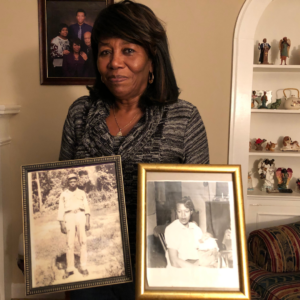The Forgotten Story of Clinton Melton
Deloris Melton Gresham was five years old. She remembers getting the news her father had been killed. She was in bed when her mother came in crying, hugging each child and saying, “Your dad won’t be coming back home.”

Deloris Melton Gresham, holding photos of her parents.
Two witnesses — including the white owner of the service station — identified Kimball as the murderer. The trial was set for March 1956. But just days before, Beulah Melton was driving home when her car crashed into the Black Bayou River. Two of her kids were rescued from the back seat of the car, but Beulah died. Because of the suspicious timing, some people in town assumed she was forced off the road; others think she took a wrong turn or lost control. But nobody knows for sure.
The Clinton Melton trial moved forward. It was held at the same courthouse as the Emmett Till case, the same sheriff was in charge, and Kimball had the same defense attorneys as the Till killers. Despite evidence and eyewitness testimony, an all-white jury found Kimball not guilty.
Today, the stories of Clinton and Beulah Melton have been largely forgotten. But Clinton Melton’s name is one of many engraved on The Monument at the National Memorial for Peace and Justice in Montgomery, Ala., honoring victims of lynching in the United States. It’s a stark reminder that for every Emmett Till whose name is remembered in history books, there are countless others whom most Americans have never even heard of.
Special thanks to Deloris Melton Gresham for sharing her story, and to Dorsey White, Keith Beauchamp, and Dave Tell. This story originally aired on NPR’s All Things Considered and appeared on the Code Switch Blog.